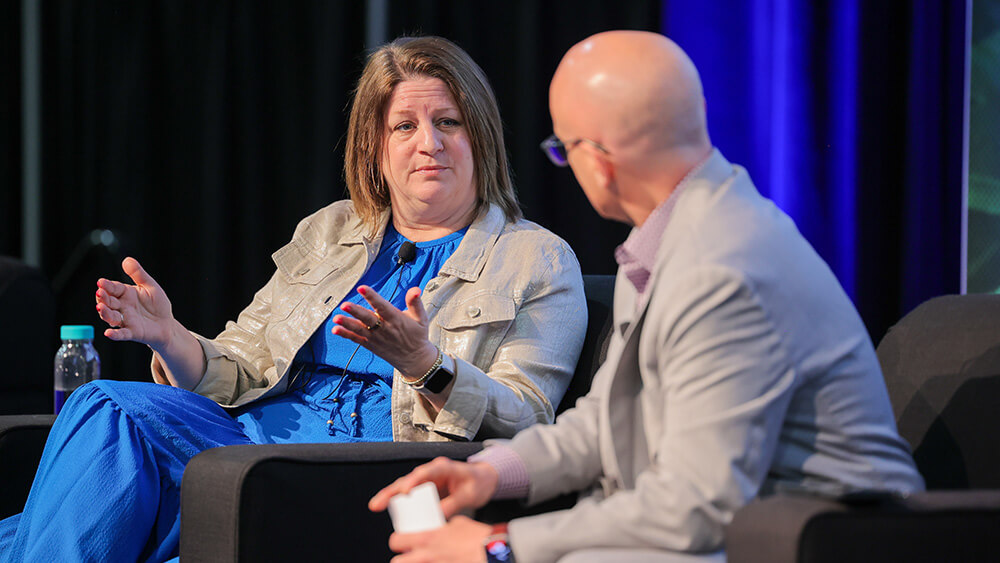
Showcase — presented by PCMA and Destinations International during Business Events Industry Week in Washington, D.C. — began with a discussion about “The State of Sourcing.” (EPNAC photo)
The topic for panelists participating in “The State of Sourcing” discussion kicking off Showcase — presented by PCMA and Destinations International on April 10 during Business Events Industry Week in Washington, D.C. — was RFPs: the good, the bad, and the ugly.
Jamie Murdock, Maritz’s managing vice president, sales, served as the moderator for panelists Melissa Fenwick, senior manager, event sourcing, Meetings & Incentives Worldwide Inc.; Mark Galbreith, director of sales and marketing, Marriott Marquis; Stephanie Turner, senior vice president of convention sales and strategies, New Orleans & Company; Kirsten Olean, senior director of meeting planning & design, Cystic Fibrosis Foundation; and Kelly Saling, senior vice president/chief sales officer, Visit Seattle.
Some of the areas the panelists touched on:
Market Dynamics — a Seller’s Market
“We’re having to add more destinations and hotels due to availability being low all over the U.S., because we want more than one option to show clients,” Fenwick said. There has been more of an emphasis at Meetings & Incentives to compare/contrast multiple properties.
Olean’s biggest challenge has been educating internal stakeholders on the more competitive nature of the market and the importance of making quicker decisions as a result. She said there now could be two to three organizations looking at the same venues over the same dates as their events, so it’s imperative to avoid going through a protracted decision-making process “so we don’t lose” out to them, she said. The amount of time it is taking to change the culture at organizations so “we can roll with the process,” she said, is challenging.
“The market dynamics are real,” Murdock agreed. He also mentioned a change in the hotel model that is having an impact on group business: Hotel ownership groups are having a bigger say in operations than they used to, rather than just leaving that entirely to the contracted hotel brand.

Kirsten Olean, senior director of meeting planning & design, Cystic Fibrosis Foundation, speaks during a panel discussion about “The State of Sourcing” at Showcase. (EPNAC photo)
It’s All in the Details
Galbreith emphasized the importance of RFPs being detailed enough for hoteliers to respond more quickly — including catering, specs related to AV, the organization’s timeline, and its history.
Saling said there is a lot of “gumming up in the middle” when it comes to the RFP process — there’s often not enough detail provided by planners and destinations don’t know how much information to give. Collectively, she said, we could improve “the back and forth” of the process. Fenwick agreed that organizers may need to reveal more than they have in the past.
One of the suggestions discussed was to start off with an RFI (Request for Information) to determine if there’s hope — or no hope — in securing a venue and destination for an event. It’s a preliminary step that could make an RFP either unnecessary or more finely tuned.
Olean said that organizers are also demonstrating “an increasing level of demand” for information from venues. She cited the example of a planner asking the venue what time of day the sun comes through the windows. As planners, “we have to be reasonable,” she said, about the level of detail we require from venues.
Human Relations
The high turnover rate at hotels continues to be a problem since the pandemic, Olean said, adding to the RFP challenge. That speaks to the heart of business events, she said, which is based on cultivating and establishing relationships, not strictly on transactional business.
The panelists agreed that suppliers and planners must partner together to be mutually successful. That requires candor and having “actual conversations,” Saling said.
When the going gets tough in the RFP process, it helps to think big picture. It’s “a great gift” to work in this business, Turner said. “The meetings industry is transformative,” she said. “It’s not always easy, but it’s rewarding.”
Michelle Russell is editor in chief of Convene.
